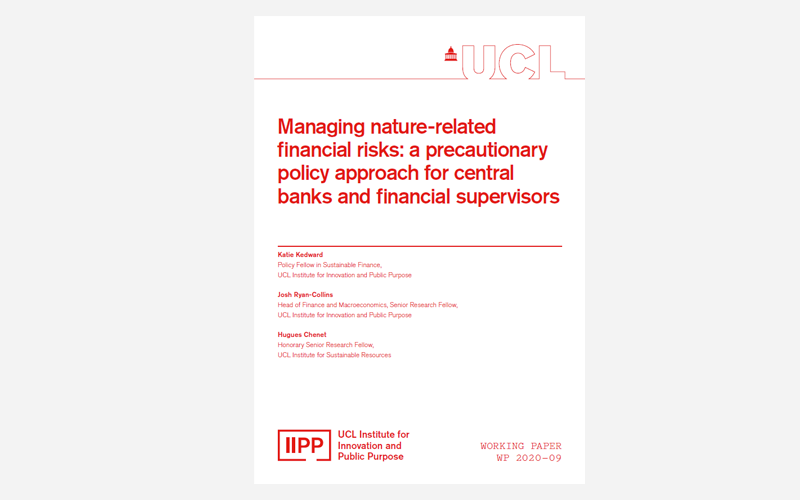Managing nature-related financial risks
A precautionary policy approach for central banks and financial supervisors.

18 August 2020
UCL Institute for Innovation and Public Purpose (IIPP) Working Paper Series: IIPP WP 2020-09
Authors
- Katie Kedward | Policy Fellow in Sustainable Finance, UCL Institute of Innovation and Public Purpose
- Josh Ryan-Collins | Head of Finance and Macroeconomics, Senior Research Fellow, UCL Institute of Innovation and Public Purpose
- Hugues Chenet | Honorary Senior Research Fellow, UCL Institute for Sustainable Resources
Reference
Kedward, K., Ryan-Collins, J. and Chenet, H. (2020). Managing nature-related financial risks: a precautionary policy approach for central banks and financial supervisors. UCL Institute for Innovation and Public Purpose, Working Paper Series (IIPP WP 2020-09). Available at: https://www.ucl.ac.uk/bartlett/public-purpose/wp2020-09
Abstract
This paper considers how financial authorities should react to environmental threats beyond climate change. These include biodiversity loss, water scarcity, ocean acidification, chemical pollution and — as starkly illustrated by the Covid-19 pandemic — zoonotic disease transmission, among others. We first provide an overview of these nature-related financial risks (NRFR) and then show how the financial sector is both exposed to them and contributes to their development via its lending, and via the propagation and amplification of financial shocks. We argue that NRFR — being systemic, endogenous and subject to ‘radical uncertainty’ — cannot be sufficiently managed through ‘marketfixing’ approaches based on information disclosure and quantitative risk estimates. Instead, we propose that financial authorities utilise a ‘precautionary policy approach’, making greater use of qualitative methods of managing risk, to support a controlled regime shift towards more sustainable capital allocation. A starting point would be the identification and exclusion of clearly unsustainable activities (e.g. deforestation), the financing of which should be discouraged via micro- and macro-prudential policy tools. Monetary policy tools, such as asset purchase programmes and collateral operations, as well as central banks’ own funds, should exclude assets linked to such activities.
 Close
Close

